EXCLUSIVE: Hacked Ballot Proves Texas Elections in CRISIS
The end of the secure elections myth.
What if your friends, family, and co-workers could see which candidates you voted for in the last election?
What if you could follow a few simple steps and, using publicly available election information from a few sources, figure out who Greg Abbott or Matt Rinaldi voted for in the Republican Primary?
Experts in election integrity have warned this is the case for millions of Texas voters, and Current Revolt has obtained the wake-up call that Texans have to see to believe:
The official ballot cast by Republican Party of Texas (RPT) Chairman Matt Rinaldi on Super Tuesday 2024:
The ballot shows Rinaldi secretly voted for Ron DeSantis after publicly endorsing Donald Trump.
Rinaldi was challenged this week on whether he genuinely supported President Trump, to which he replied that he “voted for Trump in March.”
However, Current Revolt has acquired a copy of Matt Rinaldi’s ballot showing he voted for Ron DeSantis, despite DeSantis having dropped out of the race weeks before early voting began.
We have independently verified the precinct and reporting group information, all showing a match.
We reached out to RPT Chairman Matt Rinaldi but did not receive a response at time of publishing.
How did we get this?
There are multiple methods that can be used to reveal ballots cast by voters in Texas. The Rinaldi ballot was obtained with one method. Another method, is described in a lawsuit led by Dr. Laura Pressley.
A lawsuit led by Dr. Laura Pressley against Texas Secretary of State Jane Nelson alleges that a “willful and systematic disregard of election laws” has led to the secrecy of potentially millions of Texas ballots being breached.
The suit alleges that an overwhelming majority of ballots cast in Texas elections can likely be traced and linked to the individual who cast them using publicly available information. This “breach” of a ballot is accomplished by following a process of data mining detailed in Pressley V Nelson. This means that your ballot choices from previous elections are not confidential, and unless current law is enforced by Greg Abbott, your ballot choices in future elections will not be confidential either.
A full copy of the suit can be downloaded here:
Dr. Laura Presseley, who is representing herself in the case, worked in the semiconductor industry before starting True Texas Elections, LLC, an election security consulting firm.
The methods used to identify Mr. Rinaldi’s ballot are not related to ballot numbering issues cited by the Pressley v. Nelson case.
An exhibit in the lawsuit by Presseley shows, step-by-step, how to use certain data gathered from public information requests and how to cross-reference that data to eventually be able to match specific ballots with names on the election rolls.
The fatal flaw in this specific breach is alleged to be the random numbers assigned to each ballot. The random numbers along with the method by which they are assigned are specific to each brand of machine.
It’s not hard to imagine how a unique number generated specifically for you can be traced back to you at a later date, and that is exactly what Pressley and others claim they have uncovered.
The plaintiffs say they can reverse engineer public data to produce the official ballots for most Texans who voted in person. Apparently, this exploit does not work with mail-in votes.
The ballots of the following politicians were produced as examples for the lawsuit:
Pressley asserts that the secrecy of around 85% of the ballots cast in Williamson County in the November 2023 election exists in a “breached” state, and by following a series of steps, almost any in-person ballot can be pulled and matched to the voter who turned it in.
According to the lawsuit, the basic components to be able to breach and decode a ballot exist in all the largest counties in Texas—including Harris, Dallas, Tarrant, Bexar, and Travis. As of February 2024, about 90% of Texas counties used the randomly assigned number system for ballot numbering rather than sequential numbering, even though sequential numbering prevents ballot breaching.
There is also an algorithmic competent (experts we spoke to said this was likely an encryption key) for decoding the ballots, but the specific information on the algorithms/keys has been hidden to prevent everyone’s ballots from being decoded overnight.
The algorithm/key is described by Pressley as "repetitive,” which seems to imply it was relatively simple.
Dr. Walter Daugherity, Senior Lecturer Emeritus, Computer Science & Engineering at Texas A&M University, verified the “repetitive algorithmic pattern” in the random number generation that Dr. Pressley identified for the 2023 election in Williamson County.
The declarations from Daugherity and others leave little room for doubt—when someone sees the unredacted process, they know the system is broken.
This neat trick to reveal anyone’s ballot is only the tip of the iceberg of how these electronic voting machines are not secure.
A full copy of the demonstration for pulling ballots can be downloaded here:
How many people know how to breach votes?
Matt Rinaldi lives in Dallas County. No plaintiffs in the lawsuit live in Dallas County, so this is not just a theoretical hack. It’s a trick that more people will figure out by the day.
In fact, our sources say this same exploit exists in other states.
Texas elections have been compromised.
Pressley says no new laws are needed to address this issue, but that existing laws are simply not being enforced.
Are you confused as to why the voter fraud laws are not being enforced or prosecuted?
Tucker was also confused when he asked Attorney General Ken Paxton the same question. (36 seconds)
“I’m confused. So the Attorney General in the State of Texas is not allowed to prosecute voter fraud?”
“That’s correct. Even though the legislature directed it.”
We, the people, have passed the laws; we, the people, have done our part.
Rather than allow Ken Paxton to get Texas elections in order, he is handcuffed. Rather than appoint someone serious to safeguard our elections, Greg Abbott appointed gatekeepers to try and keep people like Laura Pressley from asking too many questions.
Unfortunately for some, there are just too many questions coming from too many people.
This is a non-partisan issue. Both Republican and Democrat ballots are open to exposure. We would hope to see both parties work together to secure our elections.
Current Revolt is Texas' premier independent news source, dedicated to uncovering scams, deceit, and fraudulent activities that impact our great state. If you appreciate the work we do, please consider making a small contribution or subscribing to our news to support independent journalism. Your support is invaluable in helping us continue our mission to expose the truth and maintain the integrity of our great state.





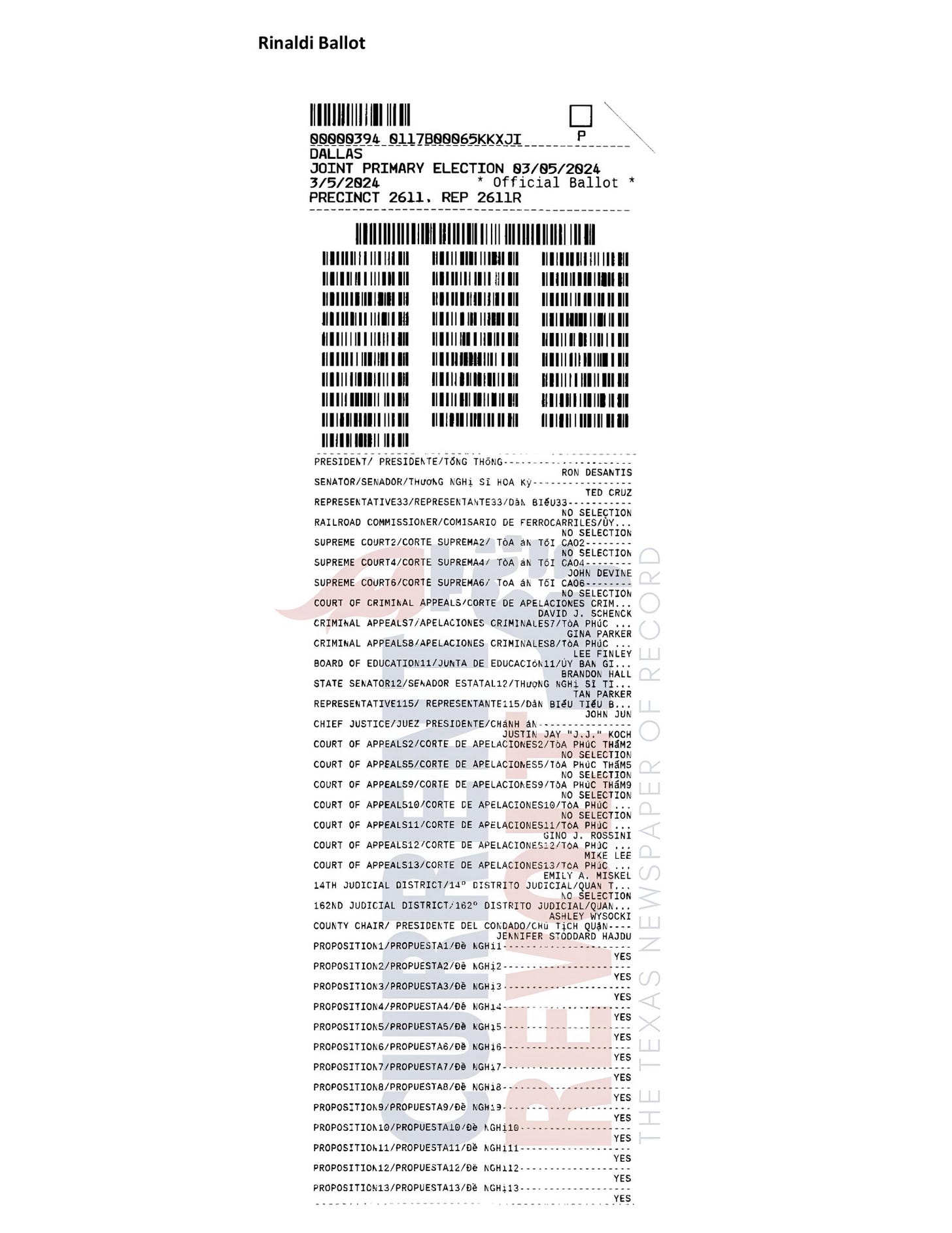

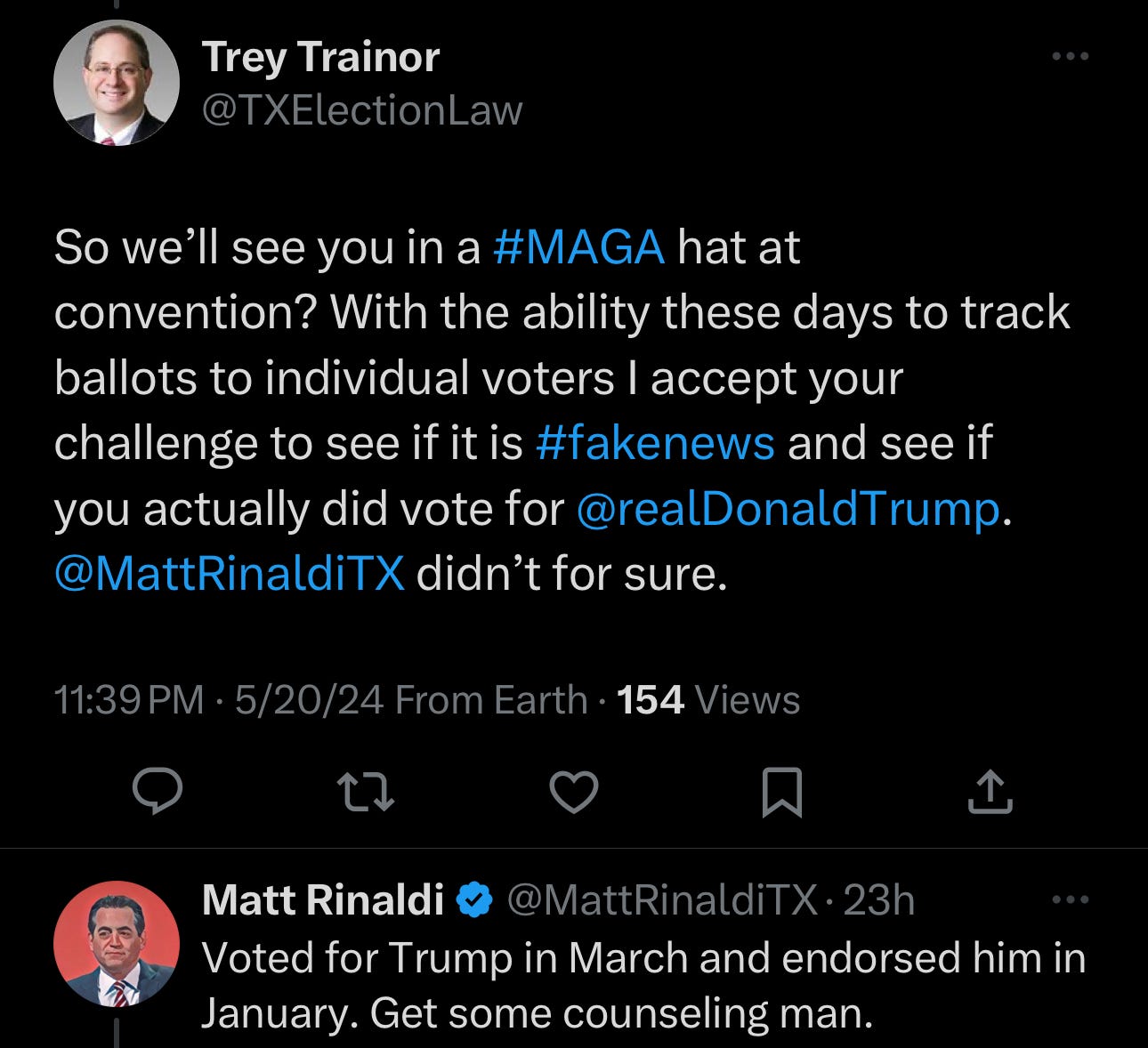
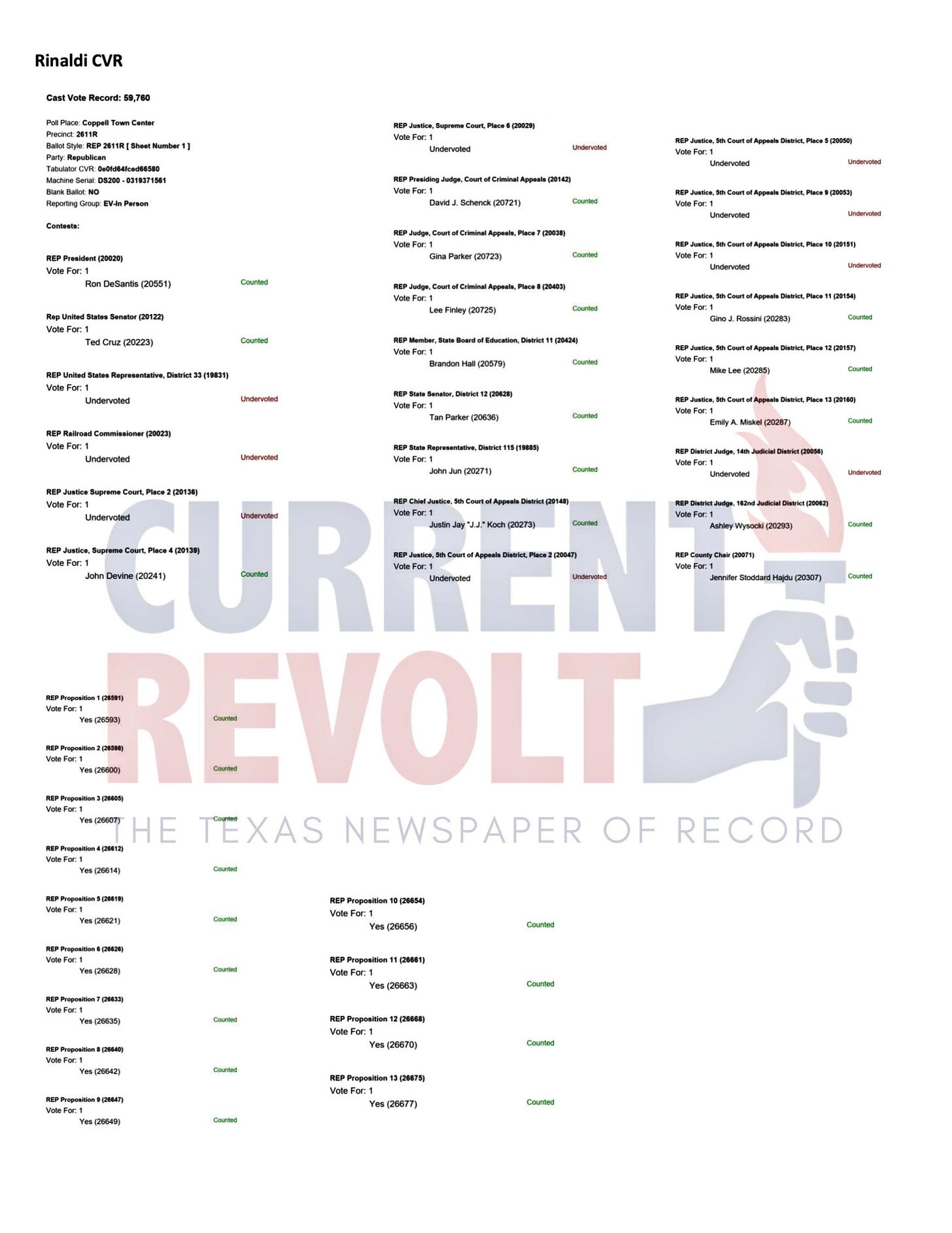
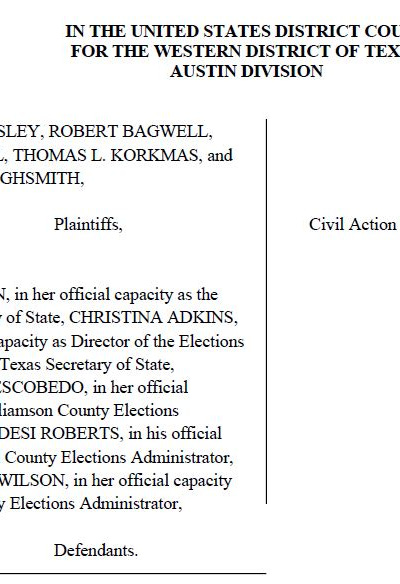
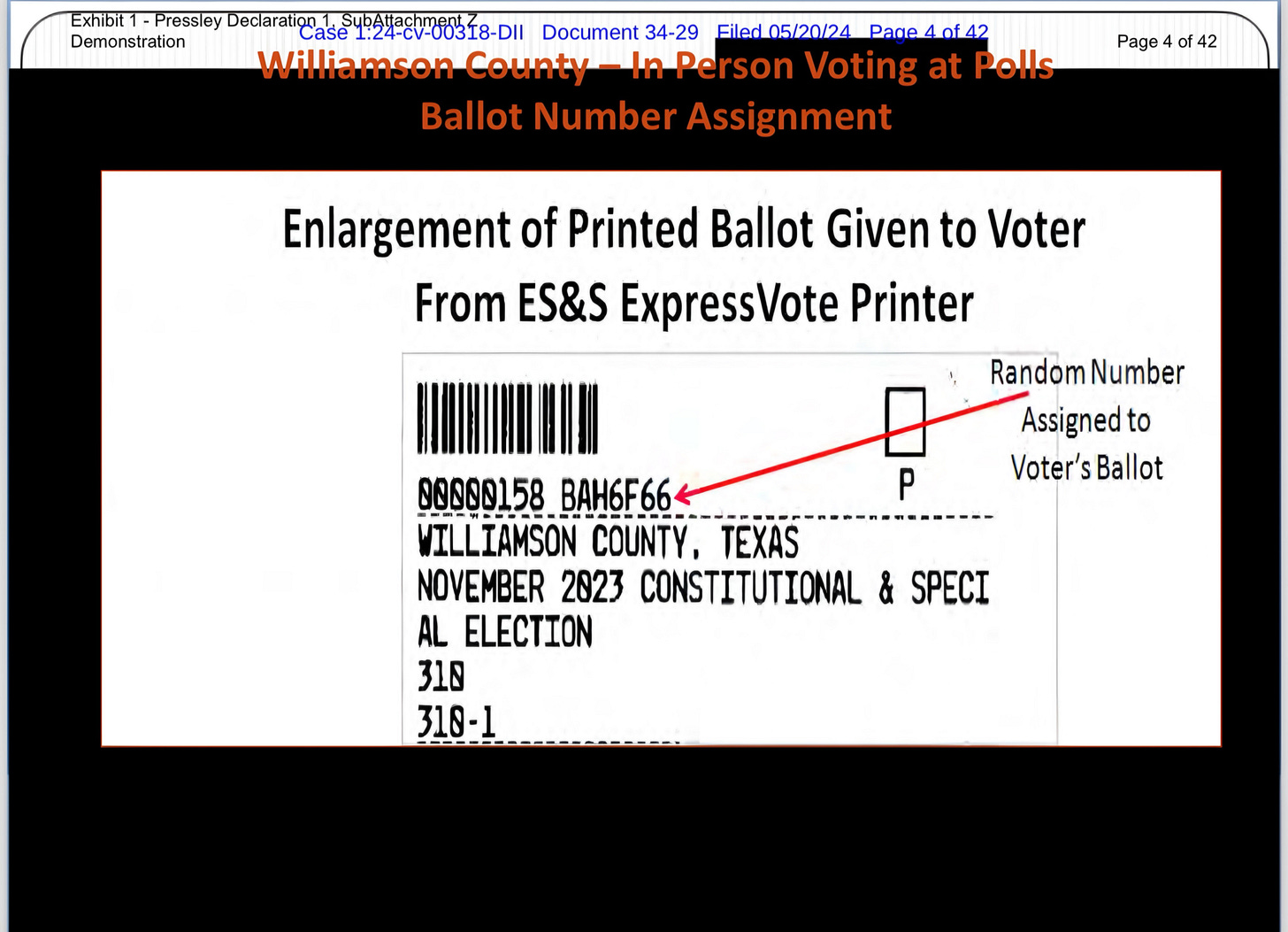

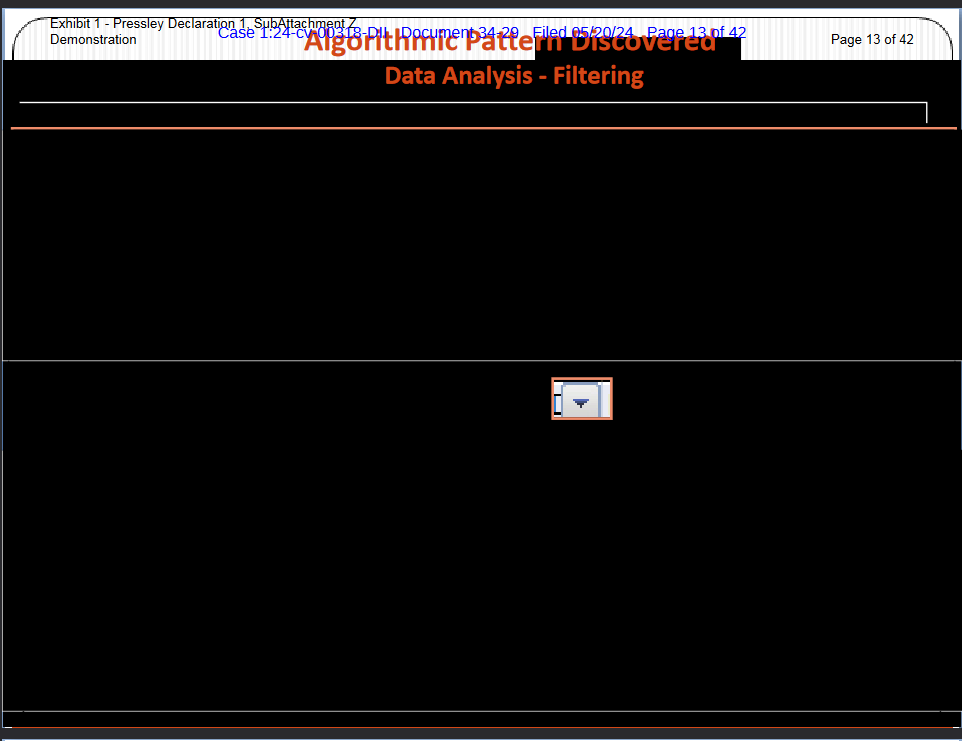

I’m just gonna vote HARDER to make my vote more secure.
Huge.